Korea has become the 9th largest economic powerhouse in the world. It has shown its enhanced reputation as a special guest at the G7 hosted by the United Kingdom. There is also the prospect that the G7 will add more members to become the G10. Korea, which has built economic strength at a rapid pace, driving industrial and economic progress, has become an advanced country. However, Korea’s reputation as an advanced nation goes further than economic power. All varieties of the Korean Wave showing Korean culture, such as the Oscar winning film “Minari” and BTS sweeping the charts, are captivating the world. Also, the Korean public showed a high-level of democracy through the candlelight demonstration. In the midst of the pandemic that brought the world into chaos, Korea responded remarkably to the disease, campaigning for “K-quarantine.” In short, Korea already had the dignity and reputation of an advanced country in many ways. Its next task would be to identify more important roles to play while maintaining its status as an advanced country. Here, some of the recently published books speak of the next step for Korea as an advanced country through various approaches.
The rise of the young generation, the leaders of advanced Korea
The older generation has made a tremendous contribution to the growth of Korea as an advanced country with outstanding passion and effort. However, the next leaders to keep Korea alive are those born in the 1990s. This generation has been blessed with advanced culture and education, let alone economic bounty. This means that they are equipped with the basic requirements as individuals from an advanced country. Therefore, some books talk about this generation as the next leaders of Korea; the best examples are Korea, Transforming into an Economic Powerhouse (Hwang Tae-Gyu, Good Plus Books) and Thinking about K: How the youth born in the 1990s sees Korea (Lim Myeong-Mook, Sideways Publishing).
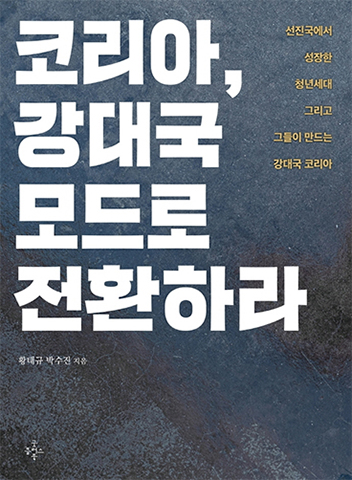
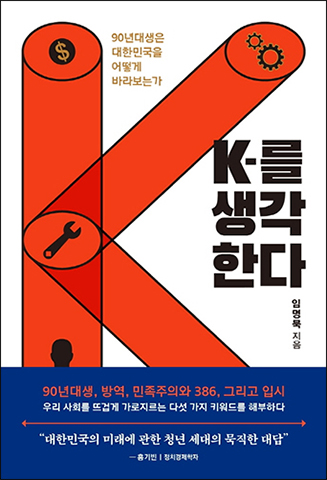
Korea, Transforming into an Economic Powerhouse,
Thinking about K: How the youth born in the 1990s sees Korea
The book Korea, Transforming into an Economic Powerhouse, which talks about economically powerful Korea led by the young generation born and raised in the advanced environment, says that our society has more things to learn from them. It emphasizes that the young generation has vested rights that the older generation does not have, which stretches from politics to the psychological realm. Society will be able to witness maximized outcomes if society gives practical power to them. The writer suggests the older generation leave our future to the hands of the young generation, drawing a “new national model” where they will continue to live in the advanced country, keeping its strong position in the world, imagining the future of Korea. He says that the young generation is equipped with relatively more outstanding elements as the first generation to receive advanced education. Hence, they are fully ready to live as individuals of an advanced country. He also points out things the society needs to prepare for the future they will lead.
Meanwhile, Thinking about K: How the youth born in the 1990s sees Korea also talks about similar things. Writer Lim Myeong-Mook, born in 1994, targets the keyword “K” (the first letter of the name Korea) and looks into the sharpest issues that most symbolically represent “Korea in the world.” He focuses on five things closely related to each other in the book: “people born in the 90s,” “K-quarantine,” “nationalism and cultural diversity,” “386,” and “issues surrounding college admission and educational system.” He analyzes why people are so enthusiastic about the keyword “K” by looking at aspects such as the hierarchical structure created by people’s pride, stress, desire, and control, contending desire to survive in the pyramid of hereditary social class and order, the collision of outwardly-promoted morality and secular desires hidden inside, and paradoxical aspiration and defiance to a powerful country. The book also suggests a new outlook on the reality facing Korea today. The author’s analysis opens a new window for readers by carefully examining the origin and context of each issue, rather than urging or criticizing them in haste. Thus, readers will be able to have a more in-depth understanding of the multiform dynamics surrounding the keyword “K.”
Korea’s advancement into an economic powerhouse comes with numerous tasks
Becoming an advanced country is not only followed by pride and admiration; there is a mountain of work to be done. The book Advanced Country Already, But Not Yet: Advice for the Future of Korea (Hanbit Biz) written by Park Tae-Woong advises on issues Korea should address as a country that has rapidly become an economic powerhouse.
Emphasizing that Korea should pay attention to other factors than just its GDP as it joins other advanced countries, the writer mentions that the historically proven best scale to measuring the healthiness of a society is the proportion of middle-income families. He underlines that societies with a strong backbone of middle-income families are always the healthiest, which in turn promotes other policies to be implemented in pursuit of this goal as it is the best indicator of state affairs. After tough years to make the country powerful, we should now wait for the soul to catch up with the body that has run so fast to this point and address issues of “cultural lag” piling up ahead. As an IT specialist, the writer keenly points out where Korea stands today, core indicators that decide an advanced country, issues of our social system, and how we should change the country to make it a truly advanced one, through various facts and insights. The book Advanced Country Already, But Not Yet: Advice for the Future of Korea enlightens readers that Korea now stands at a new starting point, providing sharp insights about issues that need to be addressed and the direction in which Korea should take to make a greater stride forward, not just satisfied with flying the flag of an advanced country.
When thinking of an advanced country, the first thing in mind would be an ideal country where no one is left behind in terms of welfare. Welfare is one of the main topics in speeches about an advanced country. The book Strange Success: What Made Korea an Unequal Welfare State? (Hanibook) written by Yoon Hong-Sik sharply points out welfare issues in Korea, a developed country. To summarize briefly, the author asserts that “Korea is an advanced country, but also an unjust welfare state.” Starting with the question “Why did Korea become an unfair welfare state?”, the book touches upon several grave issues in the complex reality giving clear answers to questions such as “Why are we unhappy even with all the success (becoming an advanced country),” “Why does Korean society not allow its youth to have time thinking about the climate crisis and world peace?”, and “What made Korea’s welfare policies only focus on full-time workers?” The writer argues, “Our success has become a trap that makes us unhappy. Paradoxically, we are unhappy because of the success we have made, not because of failure.” He thoroughly analyzes some of the issues such as why Korea has become a highly unstable country where 6 out of 10 people are “resentful” even though the country has ranked 9th in terms of the size of GDP and why increased welfare spending each year fails to lift Korea from the stigma of having the no.1 suicide rate from economic, political, historical, and social welfare perspectives. The book Strange Success: What Made Korea an Unequal Welfare State? talks about the painful reality of our society and offers solutions that will guide Korea to a more advanced country.
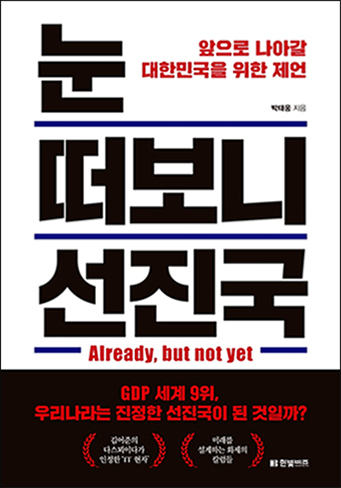
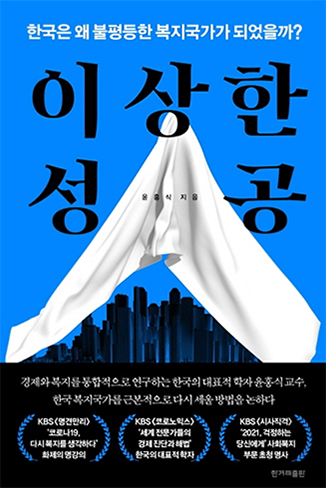
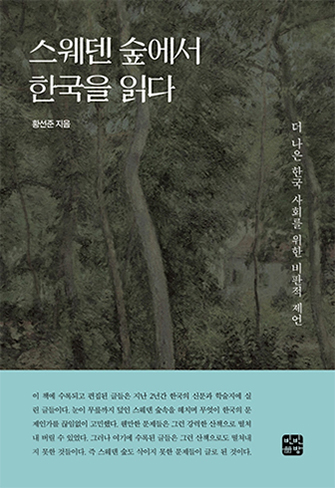
Advanced Country Already, But Not Yet: Advice for the Future of Korea,
Strange Success: What Made Korea an Unequal Welfare State?
Reading Korea in the Forest of Sweden: A Critical Suggestion for a Better Korean Society
Meanwhile, there is a book that attempts to find answers in exemplary cases from other advanced countries. The book Reading Korea in the Forest of Sweden: A Critical Suggestion for a Better Korean Society (Binbin Books), written by Hwang Sun-Jun looks at Korean society from the writer’s viewpoint who has experienced the educational system, politics, and culture of the two countries which seemingly have nothing in common. The writer explains how Sweden coped with issues the Korean society is struggling with today through cases, suggesting alternatives that can suit the Korean atmosphere rather than just arguing that we should follow their method. Critical thinking, which he learned from experience in Sweden, relies on this set of processes. These critical insights are also applicable to Swedish society. The book suggests that Swedish society also has its own struggles in various fields and is taking on challenges to resolve them. In other words, there is no society without problems, and how a society treats problems determines its future. The book covers general issues of society with five key topics of “education,” “political structure,” “climate crisis,” “human rights,” and “COVID-19,” pointing out that the role of politics is the key above all to address social issues. The author says that we should take a step back and have a broader view of interrelated political power and institutions to solve problems in each area. He argues, “It starts with issues and ends with solutions.” His sharp criticism encourages readers to reflect on how the advanced country of Korea can overcome numerous tasks ahead while suggesting solutions.
Becoming an advanced country is not the end. It is evident that we need to think again about various societies while maintaining the status and dignity as a developed country, and prepare for the next generation that will lead the country. Making various attempts and efforts to make this country a truly advanced country and paying attention to books that help us gather strength to seek solutions for a rightful path are indeed the beginning of a positive change.
Written by Kim Young-Ihm













